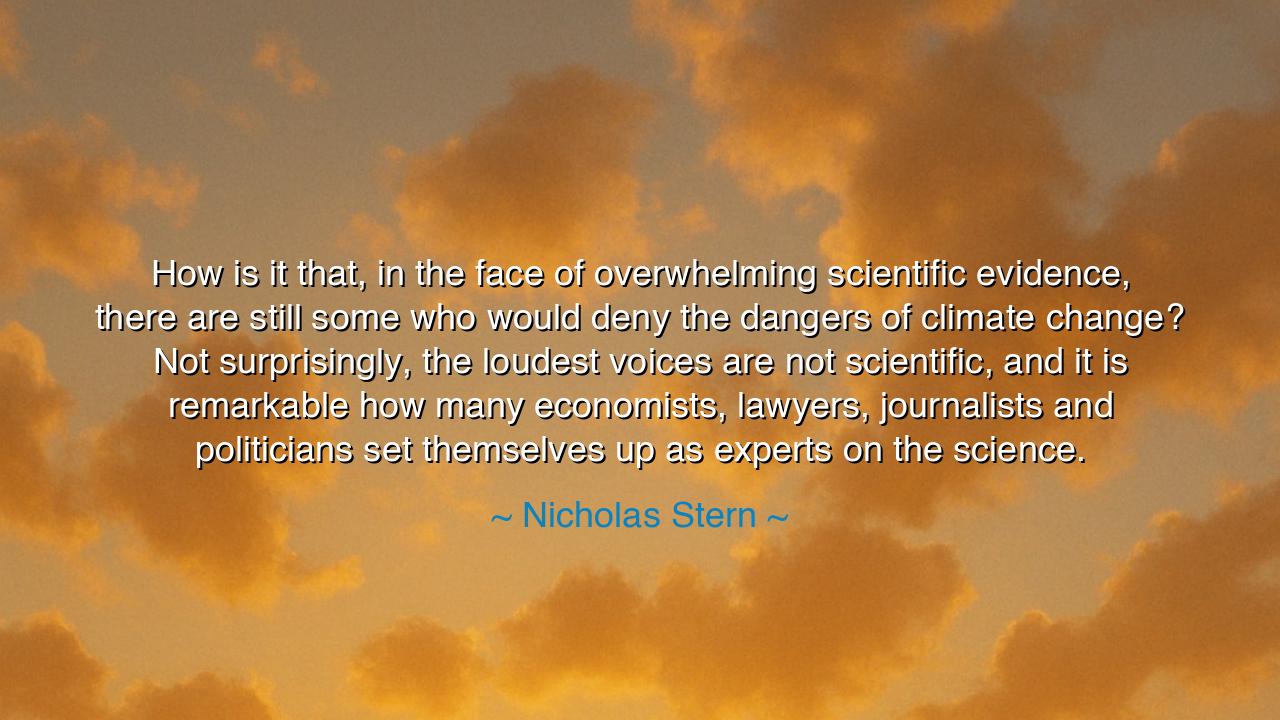
How is it that, in the face of overwhelming scientific evidence
How is it that, in the face of overwhelming scientific evidence, there are still some who would deny the dangers of climate change? Not surprisingly, the loudest voices are not scientific, and it is remarkable how many economists, lawyers, journalists and politicians set themselves up as experts on the science.






"How is it that, in the face of overwhelming scientific evidence, there are still some who would deny the dangers of climate change? Not surprisingly, the loudest voices are not scientific, and it is remarkable how many economists, lawyers, journalists, and politicians set themselves up as experts on the science." These words of Nicholas Stern ring with a powerful urgency, casting a sharp light on the disconnect between scientific truth and the narratives spun by those who lack the expertise to understand the complex web of climate science. Stern's lament is both a call to action and a reflection on the troubling human tendency to ignore or distort the truth in favor of convenience, politics, or short-term gain. It is a cry that resonates through the ages: why, in the face of truth, do we choose ignorance?
In the ancient world, when the forces of nature were not yet understood through the rigorous methods of science, the wise men and women of the age were often the first to feel the consequences of human actions on the environment. The Greeks, for example, were keenly aware of the balance between humanity and nature, believing that hubris—the arrogance of defying nature—would lead to catastrophe. The stories of King Midas and Icarus serve as timeless reminders of how the unchecked pursuit of power, wealth, and control over nature can bring about one’s undoing. In much the same way, Stern’s words reflect the modern-day hubris of those who refuse to accept the scientific evidence laid before them, choosing instead to ignore or distort it for reasons of political or economic self-interest.
Consider the story of Galileo Galilei, the brilliant astronomer who faced fierce opposition from the Church not because his science was flawed, but because it challenged the entrenched beliefs of the powerful. Galileo, with his telescope, discovered that the Earth revolved around the Sun, a truth that had long been established in the realm of science, but was still denied by the authorities. Despite overwhelming evidence, the loudest voices—the Church—rejected this truth, not because it lacked merit, but because it threatened their power. In the end, Galileo was forced to recant his findings, but the truth of the cosmos remained unshaken. This is the essence of Stern’s words: even in the face of undeniable truth, there are those who will deny it, either for fear of losing control or because their interests lie elsewhere.
Fast forward to today, and we see the same pattern unfolding around the issue of climate change. Scientists, who dedicate their lives to understanding the complex systems of our planet, have presented overwhelming evidence that human activity is contributing to global warming—to rising sea levels, to more extreme weather patterns, to the degradation of the environment. Yet, despite this evidence, there are those who, not scientifically trained, but politically or economically motivated, deny the truth. Economists, lawyers, journalists, and politicians, though their expertise may be valuable in their own fields, step into the realm of science and speak as though they understand the climate, as though they can dismiss the mountains of data and research without ever looking deeply at the evidence. This denial, Stern points out, is not merely a lack of understanding, but a willful refusal to accept what is plain to see.
This denial is dangerous, for it stands in the way of the solutions we so desperately need. The wisdom of the ancients tells us that denial is a path to ruin—whether it was the Greeks who warned against the hubris of man’s defiance of nature, or the Romans who saw the collapse of their empire in their neglect of the world’s resources. Nature is not to be trifled with, for its forces are beyond our control. Climate change, like the tides and winds of the ancient seas, is not something that can be ignored forever. It is a force that will shape the future of humanity, and those who refuse to accept its truth will face the consequences, as will the generations that follow.
The lesson Stern offers us is one of humility and responsibility. We must look to the scientific evidence, not through the lens of political ideology or economic self-interest, but with clear eyes, seeking the truth. Just as the wise men and women of the past sought to understand the mysteries of nature, so too must we listen to those who have dedicated their lives to studying our world. Science is not a tool to be manipulated for convenience, but a guiding force that reveals the path forward. We must set aside the loud voices of denial and embrace the truth, however inconvenient it may be.
In our own lives, we must act with integrity and courage, standing up for the truth even when it is unpopular. We must educate ourselves, listen to the experts, and support the scientific community in their quest for solutions. Whether through reducing our carbon footprints, supporting sustainable policies, or simply living with a greater awareness of our impact on the planet, we must take responsibility for the future. For the truth, as Stern so powerfully reminds us, is undeniable, and the consequences of ignoring it will affect us all. Let us choose, then, to live in harmony with the world around us, guided by the wisdom of science, and not by the fleeting interests of those who would lead us astray.






AAdministratorAdministrator
Welcome, honored guests. Please leave a comment, we will respond soon